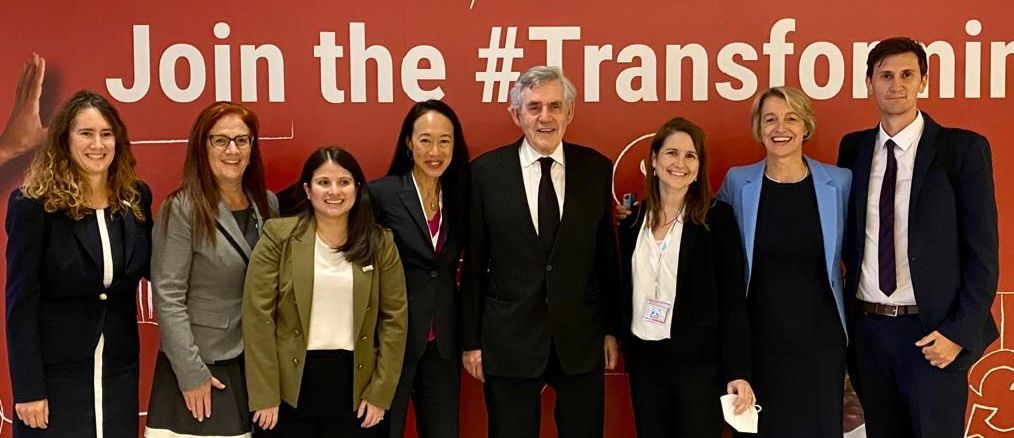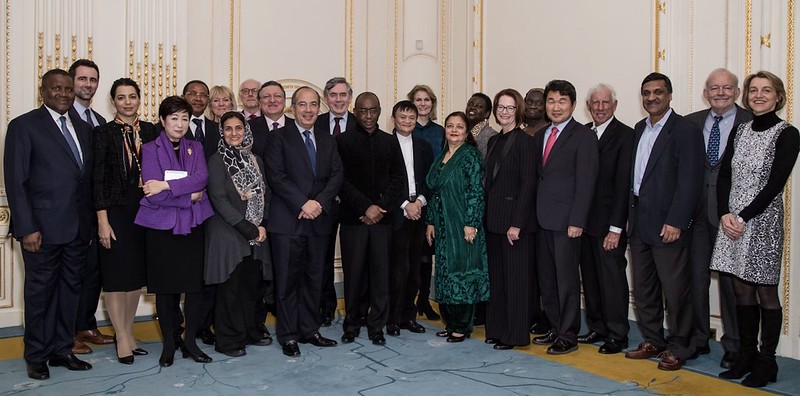Inaugural Education Commissioners’ meeting in London, 2016
“There is nothing more powerful than an idea whose time has come.”
–Victor Hugo
by Liesbet Steer
I’m writing this on my final day as Executive Director of the Education Commission after seven very happy and productive years. A good moment to reflect on our journey, our achievements, and our plans for the future.
Where it all began
The Commission’s journey started in 2015 at the Oslo Education Summit. The Summit, hosted by the Government of Norway, set out to mobilize renewed political commitment to education. To help do this, leaders agreed to establish the International Commission on Financing Global Education Opportunity – chaired by UN Special Envoy for Global Education Gordon Brown and co-convened by Indonesia, Chile, Malawi, Norway, and the UN Secretary-General. I had the privilege to be asked by Gordon Brown to help lead this effort. Working with him and the incredible group of people he assembled on the Commission has been a deeply rewarding experience for which I am forever grateful.
The Commission’s 2016 Learning Generation report delivered a stark warning. Continuing existing trends would result in 825 million young people – about half of today’s young generation – reaching adulthood without the necessary skills to thrive. But the report also presented a 12-point plan to address the learning crisis – a plan that became the focus of our efforts in subsequent years.
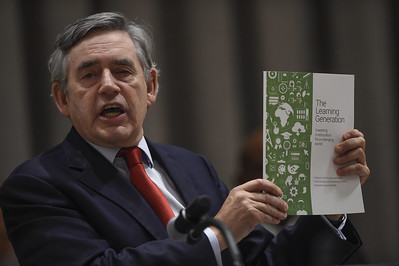
Commission Chair Gordon Brown launches the Learning Generation report at the United Nations in New York, 2016.
The report was produced together with 100+ researchers from more than 30 institutions across the world and its messages reached millions (yes, it was helpful to have Shakira on the team!). But beyond video messages from pop stars and celebrities, the engagement with the report from academic, policy, and media circles has been strong. It has been downloaded 60,000 times and Learning Generation multimedia assets have been viewed more than 6 million times. It introduced new concepts like progressive universalism and stimulated high-quality evidence-based policy debates. Overall, it has had a significant impact on global conversations around education and development, and its ideas and recommendations continue to shape policy discussions and initiatives.
Big ideas needed!
With Sustainable Development Goal 4 (SDG4), the world’s nations set outrageously ambitious, but entirely appropriate goals. From the beginning it was clear that achieving quality education for all by 2030 was impossible under current trends. New approaches were needed for the finance and delivery of education, with modern thinking on staffing, technology, and accountability. These are the imperatives that the Education Commission has focused on.
Since its inception, the Commission has worked with partners on several transformative ideas which are being embraced by the wider education and development communities, and taken forward as part of the Commission’s continued work.
1. Finance transformation: the International Finance Facility for Education
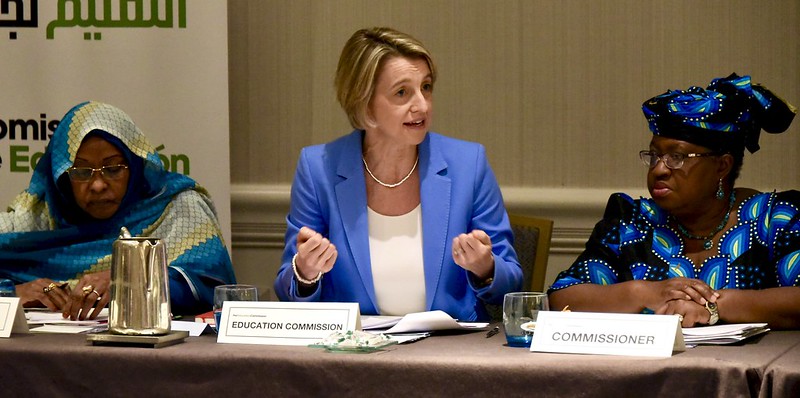
Commissioner Ngozi Okonjo-Iweala and Executive Director Liesbet Steer discuss IFFEd with beneficiary countries in Washington, DC, 2019
After rigorous analysis of the gaps in the education financing landscape, the Commission called for the establishment of the International Finance Facility for Education (IFFEd). IFFEd is now an institution based in Switzerland and it was a pleasure to sign the statutes of incorporation this month in Geneva. It introduces a new form of quasi-equity for the multilateral development banks that enables these banks to multiply donor dollars seven times, providing affordable financing for education in lower-middle-income countries. IFFEd’s innovation also has potential beyond education as recognized in the recent G20 high-level report on the MDBs Capital Adequacy Framework. Beyond IFFEd, the Commission also helped establish the Education Outcomes Fund (EOF), an innovative funding mechanism that engages private investors and ties funding to measurable results, and has been hosting the Global Education Forum, a platform to encourage greater donor coordination.
2. Learning transformation: High Touch High Tech

Commissioner Ju-Ho Lee opens the HTHT Summit in Seoul, 2021
Under the leadership of our former Commissioner and now South Korea’s Deputy Prime Minister and Minister of Education Ju-Ho Lee, the Commission developed the High Touch High Tech initiative (HTHT). Based on existing evidence around the impact of personalized learning approaches, HTHT seeks to combine adaptive technology (High Tech) with the personalized teaching and cultivation of students’ higher order skills and socio-emotional growth (High Touch). Initial pilots in Vietnam and Korea have demonstrated promising results and work is ongoing to expand its implementation in Uruguay, Cambodia, and the Philippines.
3. Education workforce transformation: learning teams

The Education Workforce Initiative High-level Steering Group meets with country partners in Accra, 2019.
Based on global evidence on designing, diversifying, and strengthening the education workforce set out in the Commission’s Transforming the Education Workforce report, the Commission introduced the idea of learning teams which promotes new roles and collaborative teams in education moving from a teacher-centered to a child-centered approach to learning. The COVID-19 pandemic reinforced the critical importance of teamwork in education and the need for teachers to be supported by school leaders, parents and caregivers, community volunteers, and community health workers, as well as the rest of the education system so learning can continue even in the most challenging situations for the furthest left behind. We are delighted to be working with Ghana and Sierra Leone to implement elements of learning teams and to continue our research agenda in this area.
4. Delivery transformation: delivery approaches
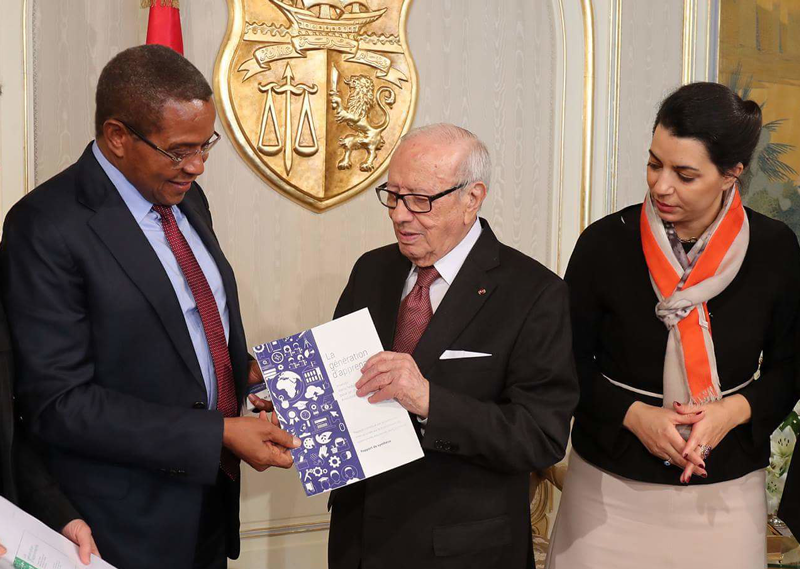
Commissioner Jakaya Kikwete and Amel Karboul present the Learning Generation report to former Tunisian President Beji Caid Essebsi in Tunis, 2017.
Our Commissioner and former President of Tanzania, Jakaya Kikwete, visited 20 heads of state and high-level leaders in Africa to share the recommendations of the Commission. There was strong agreement with the recommended policy reforms (the what) but many questions about the process to implement reforms effectively (the how). This led the Commission to analyze whether delivery approaches, implemented in some way or form in various sectors in 80 countries, could be a key strategy for service delivery transformation and more effective implementation of policy reforms. The results of this work are due to be published in the coming months.
5. Cross-sectoral transformation: Education as key to achieving ALL SDGs
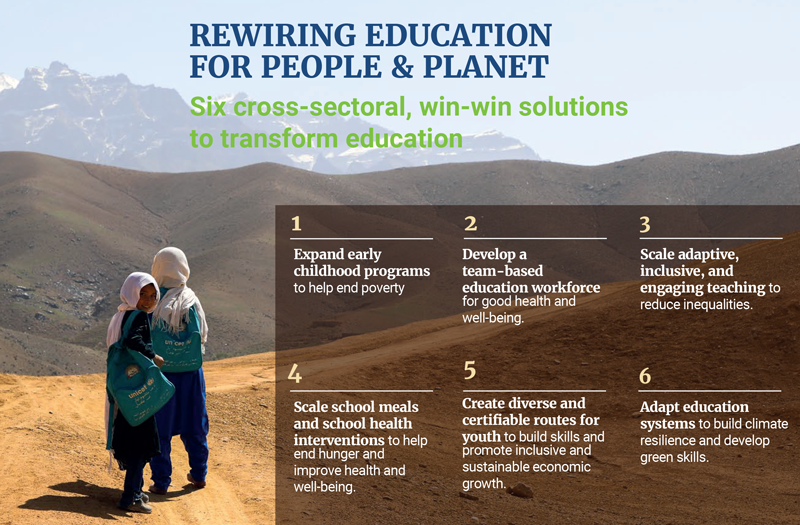
Our Rewiring Education For People and Planet report calls for increased cross-sectoral collaboration.
Amidst compounding global crises and limited resources, we must recognize the power of partnerships and link education to efforts across other sectors that unlock win-win solutions and trigger mutually beneficial impact for people and planet. We called for this increased cross-sectoral collaboration in our Rewiring Education for People and Planet report. We’ve also pioneered this Cross-Sectoral Action with our Sustainable Financing Initiative for School Health and Nutrition as part of the School Meals Coalition and our work on education and climate.
Our special sauce
Over the past few years, we have been reflecting on the special combination of skills that has made the Commission effective. Its success has been the result of our unique combination of assets –- our Commissioners, our Commission team, and our Commission partners – and our unique approach towards impact which has combined research and analysis, action on the ground, and global amplification and coalition building. We analyze, we act, and we amplify!
Lowering our flag and forging partnerships has been a way of life for us. We demonstrated this in our work on the Save Our Future campaign which we initiated and hosted, but this collective effort was co-owned and driven by a partnership of global actors. It resulted in a unique report: the Save Our Future White Paper in which 14 of the largest education international institutions set out a common message and position around investment in education amidst the COVID-19 crisis.
Where to go? From ideas to action
Over the past few years, people have asked what is next for the Commission. Commissions aren’t supposed to exist for 7 years. Our Commissioners have served us well above and beyond. But the task is far from over. This year is the mid-point towards the 2030 SDGs and the report card is grim.
This leaves us with a responsibility to continue our work with determination and to continue finding ways to generate big ideas and turn them into action. This is why I am excited to be assuming the role of President and CEO of the Education Development Center which has a long track record of research and innovation, and on-the-ground implementation and impact – it will provide a strong platform to continue translating the Commission’s agenda into action.
As I look back and look ahead, I want to send a very heartfelt thank you to our Commissioners, our wonderful team, and the many partners I’ve had the privilege to work with. I look forward to continuing this journey from my new perch!
Liesbet Steer
February 28, 2023
